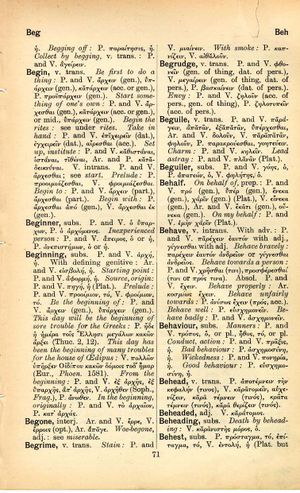begin
ἀσκέειν, περὶ τὰ νουσήματα, δύο, ὠφελέειν, ἢ μὴ βλάπτειν → strive, with regard to diseases, for two things — to do good, or to do no harm | as to diseases, make a habit of two things — to help, or at least, to do no harm
English > Greek (Woodhouse)
v. trans.
Be first to do a thing: P. and V. ἄρχειν (gen.), ὑπάρχειν (gen.), κατάρχειν (acc. or gen.), P. προϋπάρχειν (gen.).
Start something of one's own: P. and V. ἄρχεσθαι (gen.), κατάρχειν (acc. or gen.), or mid., ὑπάρχειν (gen.).
Begin the rites: see under rites.
Take in hand: P. and V. ἐπιχειρεῖν (dat.), ἐγχειρεῖν (dat.), αἴρεσθαι (acc.).
Set up, institute: P. and V. καθιστάναι, ἱστάναι, τιθέναι, Ar. and P. καταδεικνύναι.
V. intrans. P. and V. ἄρχεσθαι; see start.
Prelude . P. προοιμιάζεσθαι, V. φροιμιάζεσθαι.
Begin to: P. and V. ἄρχειν (part.), ἄρχεσθαι (part.).
Begin with: P. ἄρχεσθαι ἀπό (gen.), V . ἄρχεσθαι ἐκ (gen.).

